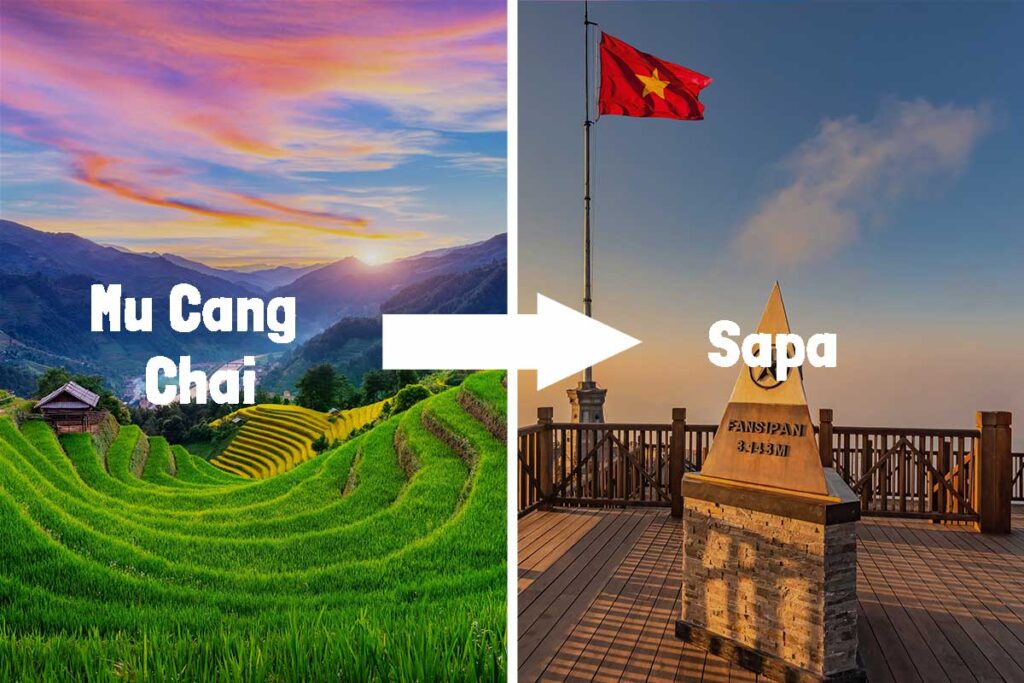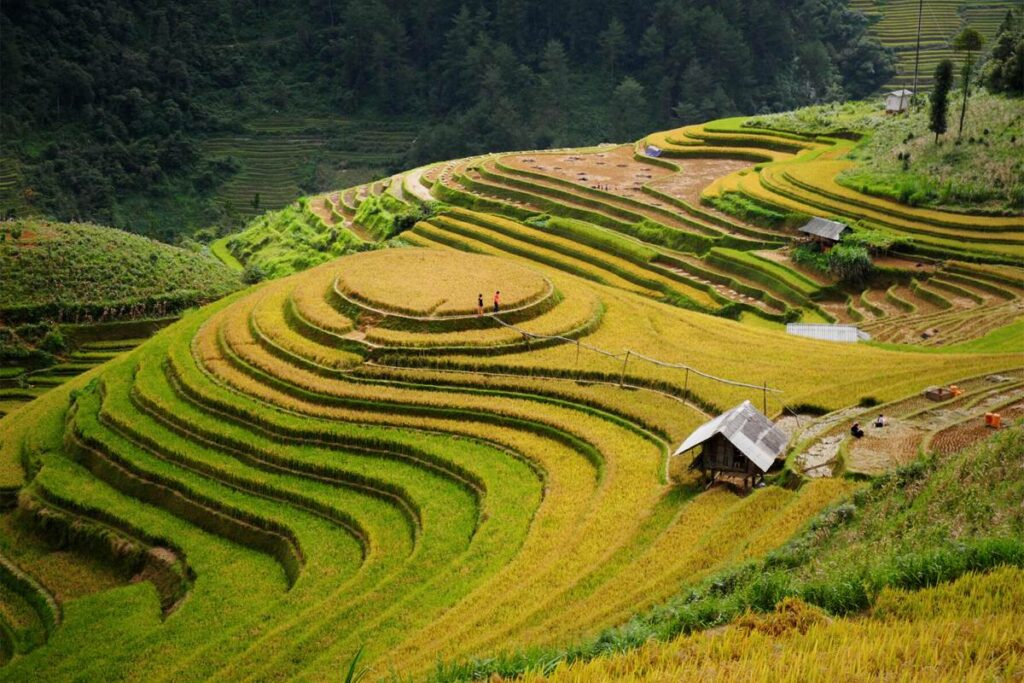Overview of the Route from Mu Cang Chai to Sapa
Should you combine Mu Cang Chai and Sapa?
Both Mu Cang Chai and Sapa are famous for terraced rice fields and ethnic cultures, but the experiences are quite different.
If your main goal is simply trekking through rice fields, it usually makes more sense to choose one. Doing both means adding extra travel time and arranging private transport, which may not be worth it if the focus is just on trekking.
The reason to combine them is if you feel that Mu Cang Chai offers the off-the-beaten-track experience you’re looking for, but you still want something that only Sapa can offer — like climbing Fansipan, visiting some of the more developed attractions, or staying in lodges or higher-end hotels overlooking rice fields, which are less available in Mu Cang Chai.
Tip: Mu Cang Chai + Sapa tour
If you’re looking for an easy way to combine Mu Cang Chai and Sapa with incredible trekking in both regions, check out the hiking tour below.
Mu Cang Chai & Sapa 5 Day Tour: Rice Fields & Ethnic Life
- Experience: Trekking through the most stunning rice terraces of Mu Cang Chai and Sapa.
- Includes: All transfers from Hanoi, local guides, accommodations, and transport between Mu Cang Chai and Sapa.
The Route from Mu Cang Chai to Sapa
The distance from Mu Cang Chai to Sapa is about 150 kilometers, depending on where exactly you start.
Travel time is typically 4 to 5 hours.
The road is paved and generally in good condition, but it winds through the mountains with plenty of curves. While not a fast drive, it’s an incredibly scenic route, passing through Hoang Lien National Park, around Fansipan Mountain, and over the Tram Ton Pass — the highest mountain pass in Vietnam.
There are only a few public buses between Mu Cang Chai and Sapa. This is because Mu Cang Chai is a remote district with accommodations scattered across villages and without many tourists visiting, making regular bus routes impractical.
Option 1: Private car with driver
How the private car option works
A private car with driver is the only practical and comfortable way to travel from Mu Cang Chai to Sapa. It’s a door-to-door service, meaning you get picked up directly from your homestay, hotel, or anywhere in Mu Cang Chai district and dropped off at your accommodation in Sapa.
It’s a comfortable and flexible option. Drivers are always happy to stop for photos, scenic viewpoints, or coffee breaks along the way, especially over Tram Ton Pass, which is one of the most beautiful mountain roads in Vietnam.
Keep in mind that this is not a guided service. The driver won’t take you into villages or explain local culture. If you want to turn the journey into more of an experience — with village visits, cultural stops, or short hikes — you can add a guide. But for most travelers, just a driver is perfectly fine for an A-to-B transfer with scenic stops.
Important: Since Mu Cang Chai has almost no local drivers available, cars are usually dispatched from Sapa. This means you should book your car at least a few days in advance to give enough time for logistics.
Rent a private car with driver from Mu Cang Chai to Sapa
We can arrange a private car with driver for the journey from Mu Cang Chai to Sapa, or even starting directly from Hanoi. Enjoy a comfortable door-to-door service, with the option to stop for scenic views along the way — including Tram Ton Pass.
Quick Facts – private car
- Duration: 4–5 hours
- Departure: Anywhere in Mu Cang Chai district
- Arrival: Anywhere in Sapa
- Comfort level: High – private, flexible, and comfortable
- Cost: ~$130–180 USD per car (depending on exact pickup location)
- Booking: Local agencies (like Local Vietnam)
- Best for: Travelers who want comfort, privacy, and convenience without the stress of arranging on the spot
Option 2: Direct bus from Mu Cang Chai to Sapa
How the bus to Sapa works
There are only a few direct buses between Mu Cang Chai and Sapa. That’s because Mu Cang Chai is still an off-the-beaten-track destination, and the route to Sapa is not commonly used by locals. As a result, only a couple of companies operate this route, and mainly during the busier travel seasons (around the rice growing and harvest periods, from June to October). Outside of those months, buses may run less frequently or not at all.
Buses usually depart in the morning from a central location in Mu Cang Chai town. If you’re staying at a homestay or lodge in the countryside — which most travelers do — you’ll need to arrange your own transfer to the town. In some cases, the bus can pick you up along the main road, but this must be arranged in advance. Your accommodation can usually help organize a short motorbike or car ride to meet the bus.
Type of buses and prices
The buses are small-sized — more comfortable than a van, but not full-sized sleeper or limousine buses. Expect basic seating, no beds or luxury. Prices range from $11–13 USD, depending on the operator. Travel time varies between 4 and 6 hours, depending on road conditions, weather, and rest stops.
How to book bus tickets
You can book tickets online via 12Go, or contact the bus companies directly through Facebook or WhatsApp. The two main operators currently running this route are:
- Grouptour
- Sapa Ethnic Travel
Some accommodations in Mu Cang Chai may also help you book tickets, but it’s best not to wait until the last minute, especially outside the high season. Seats are limited, and on some days, there may be no bus at all, so it’s safer to book in advance (don’t wait for booking until you already are in Mu Cang Chai!).
Travel tip:
Want a worry-free trip between Mu Cang Chai and Sapa? Local Vietnam can arrange everything as part of a combo tour — including transfers, accommodations, and trekking experiences in both regions.
Option 3: Motorbike (Self-drive)
How the motorbike route works
Riding a motorbike from Mu Cang Chai to Sapa is an adventure in itself. The road is incredibly scenic, passing through mountains, valleys, and over the Tram Ton Pass — the highest mountain pass in Vietnam. It’s not just a transfer; it’s a highlight of the trip.
This route is best suited for experienced riders. While traffic is minimal compared to other parts of Vietnam, the winding mountain roads require focus and confidence.
Many travelers combine this route with a multi-day motorbike loop, such as Hanoi → Mu Cang Chai → Sapa → Hanoi or continuing onward to Ha Giang.
Important: Motorbikes are typically rented in Hanoi, since one-way rentals from Mu Cang Chai to Sapa are generally not possible. You’ll need to plan the full loop or arrange return of the bike to Hanoi.
Quick Facts – Motorbike
- Duration: 4–5 hours (longer with scenic stops)
- Departure: Anywhere in Mu Cang Chai
- Arrival: Sapa town
- Comfort level: Depends on riding experience – scenic but physically demanding
- Cost: ~$10/day (rental) + fuel
- Booking: Hanoi-based motorbike rental shops (check policies on loops or returns)
- Best for: Experienced riders, photographers, and adventure travelers who enjoy remote mountain roads
Tips for traveling from Mu Cang Chai to Sapa
Arrange transport in advance
There are very few drivers based in Mu Cang Chai, so private cars often come from Sapa. Book at least a few days in advance to avoid last-minute stress.
The Road is the highlight
The drive itself is one of the most scenic in northern Vietnam, especially the section over Tram Ton Pass, with views of Fansipan and Hoang Lien National Park.
Prepare for a remote journey
There’s not much along the way. Bring enough snacks, water, and fuel (if driving a motorbike), as restaurants and shops are limited.
Full tank for motorbike
Fuel stations are limited on this route. Make sure to fill up before leaving Mu Cang Chai. Running low on fuel mid-way could be a problem.
Motion sickness warning
The road is paved but winds through mountains with sharp curves. If you’re prone to car sickness, it’s smart to take motion sickness medication before the drive.




